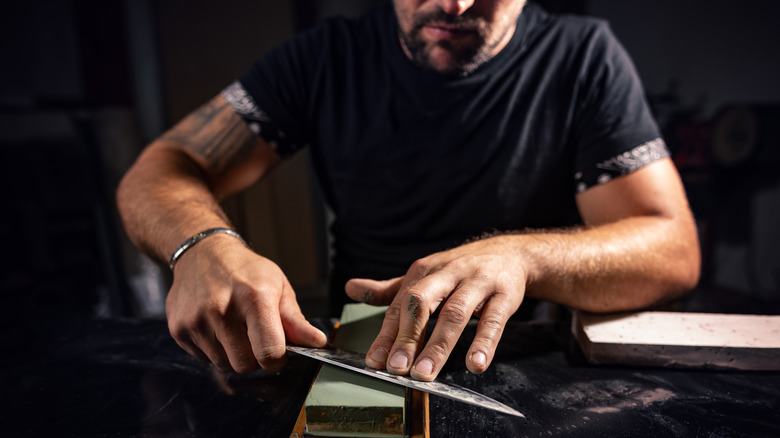Think Twice Before Pulling Out The WD-40 To Clean This Kitchen Essential
You may have not touched it in months (or years), but if you have a kitchen and a few cooking knives, you probably also own a sharpening stone, also known as a whetstone. This useful and somewhat alluring kitchen tool is the key to sharpening dull knives in the kitchen; and just like any tool, it also needs to be cared for and maintained. While WD-40 is a go-to for cleaning greasy garage tools, it might not be the best choice when it comes to your sharpening stone.
Sharpening stones function by shaving away a very small portion of your knife — with the proper technique, this should be the part of the knife that was already somewhat jagged and dull — to unveil a sharper, more honed version. Over time, your sharpening stone will become gunked up with small metal shavings from your honing sessions. If never cleaned, the whetstone will lose its efficacy.
While WD-40 is an excellent degreaser in and around the home, it is not a suitable option for whetstones. Given its light body and quick rate of evaporation, WD-40 will neither protect the sharpening stone nor will it remove accumulated metal shavings.
WD-40 approved kitchen tasks
WD-40 is not a great choice for cleaning your whetstone, but there are still merits to using it around the kitchen for maintenance and more. As a versatile degreaser, WD-40 can be handy when cleaning greasy and grimy spots, such as the inside of your oven and the hood above your stove. It also helps to remove sticky label residue, if you like reusing leftover glass jars from pasta sauces. You can also whip out the spray to lubricate squeaky cabinet hinges or to help your kitchen drawer tracks have less resistance.
Although WD-40 may be a useful tool for around the house, remember that it is still a flammable aerosol compound made up of chemicals. Never use the product around open flames or gas sources. Before using WD-40, ensure that the space is well-ventilated and far away from animals and children, as inhalation can be toxic or result in dizziness. Avoid direct skin contact by using gloves and thoroughly wash any items that you have cleaned WD-40 with to prevent accidental contact.

